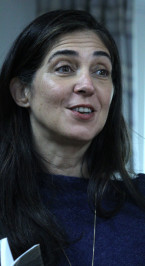Victoria Chang wins 2024 Forward prize for best collection

The American poet Victoria Chang has won the £10,000 Forward prize for best collection with ‘With My Back to the World’ (Corsair), which engages with the paintings and writings of Agnes Martin, the celebrated abstract modern artist. After being shortlisted for the prize, she told the Forward Arts Foundation that the collection “emerged rather organically, like most of my work, although it might not seem so. The Museum of Modern Art had commissioned a poem and I selected a piece by the artist and writer, Agnes Martin to respond to. But when I read the poem aloud for the first time, I suddenly realised that I wanted to keep corresponding with Martin and her work. Because of the challenges I was facing in my life related to my father dying, as well as some mental health issues I was dealing with, suddenly Martin’s work had a profound poignancy that it hadn’t before. I think working within the tradition of the ekphrastic was both exhilarating and challenging.”
Victoria Chang’s publications include The Trees Witness Everything and OBIT, which received LA Times Book Prize and Anisfield-Wolf Book Award in Poetry, and was a finalist for the Griffin International Prize and National Book Critics Circle Award, as well as longlisted for the National Book Award. She was born in Detroit, and is based in Iowa.
The Forward prizes readings and results took place on Thursday evening at Durham book festival.
The chair of judges was actor, presenter and poet Craig Charles, who was joined on this year’s judging panel by the poets and writers Jane Clarke, Alycia Pirmohamed, Vanessa Kisuule and Daniel Sluman.

Lotfi said that at first her parents were in favour of the clerical revolution in Iran, and thought that change would be good. They even took their children to demonstrations - “we saw a lot of things we shouldn’t see”. But things changed, as she relates in ‘Shut Out the Noise’, “the words on every brick / hurtled through our window: / Yankee go home.” She added: “Eventually it was too unsafe for my blonde, tall American mother to leave the house.” (‘Crossing the street for mother’s cigarettes’).
Leyla Josephine, a poet, film and theatre maker from Glasgow, won the Best Single Performed Poem category for ‘Dear John Berger’. Her show Hopeless was shortlisted for Saboteur’s Best Spoken Word Show award in 2017, and her spoken word album Archive:Live! was released in 2020.
In an interview with the Forward Arts Foundation she said: “I started writing poetry after my dad died suddenly in 2011. Someone suggested that I try writing to help me process what had happened. It’s amazing how some of the most incredible things can be born in the darkest moments. I never considered my writing to be poetry, and I had never thought of sharing what I had written until a friend asked me to come along to an open mic.
“In those early days, I fell in love with the immediacy of spoken word nights; you could write something on the bus on the way to the gig and get it off your chest right away. I fell in love with the intimacy; connections were deeply forged, and experiences were shared very freely. There was nothing more thrilling than watching messy thoughts and feelings pour out of performers and audiences in sweaty pubs or dark club basements. There’s so much risk in spoken word, so much vulnerability and that was something that drew me to the art form.
“Now, I’m a little different. I take much more time before I share anything. I carefully consider what to say and how to say it, with edit after edit after edit. But back then, when I first got into it, it felt like there were no limits. I still look fondly on those days that we created little mismatched, quirky, ever-changing communities. Communities that came together to talk about life, reflect on Communities that came together to talk about life, reflect on identity, make each other laugh and to dream about to make the world a better place.”
Cindy Juyoung Ok won the Best single poem - written prize for ‘Ward of one’, published in Poetry London, a poem that features scenes of prolonged domestic abuse. She is the author of Ward Toward from the Yale Series of Younger Poets (2024), a former schoolteacher in physics, and now a creative writing professor in Iowa. She described the poem as “a key poem from my poetry collection Ward Toward, published in the UK this spring. The book’s title and the poem’s reworking happened together, and it was one of the last poems I wrote in full. It describes self-soothing as an adult through images of self and art in childhood, ones forgotten until these instants of great mental compression.”




